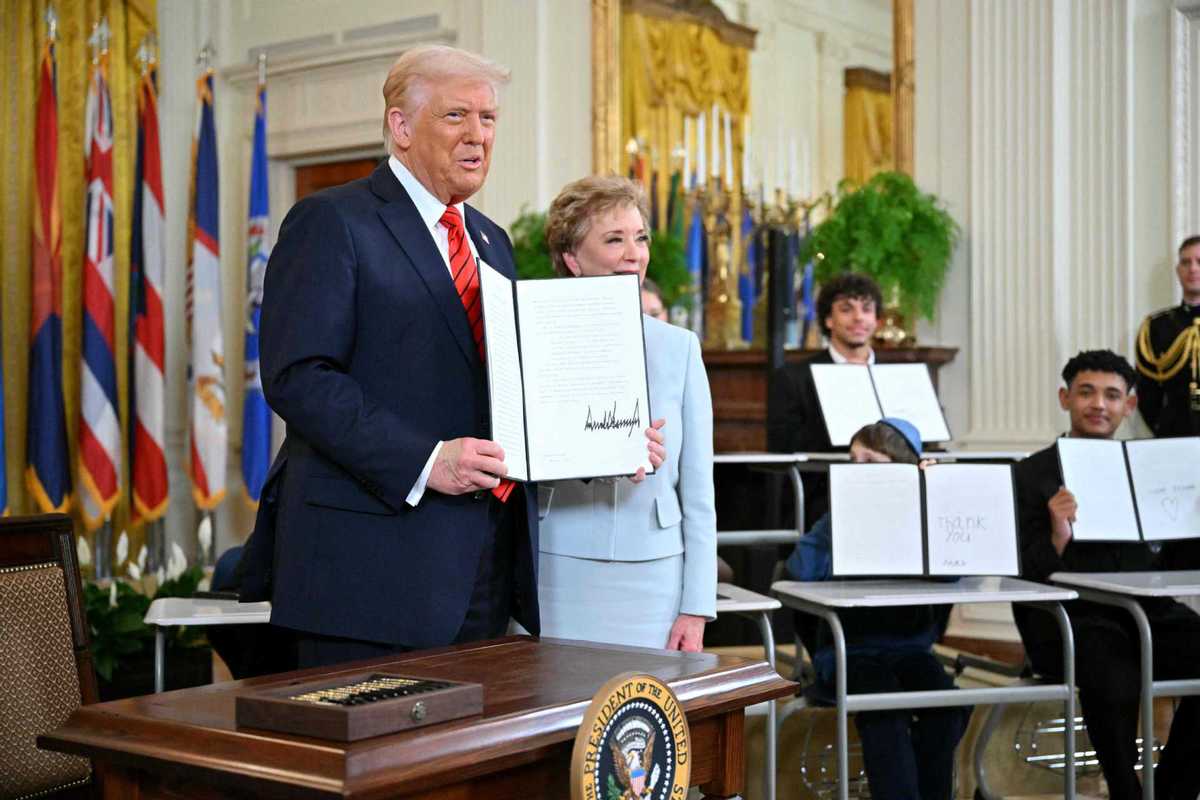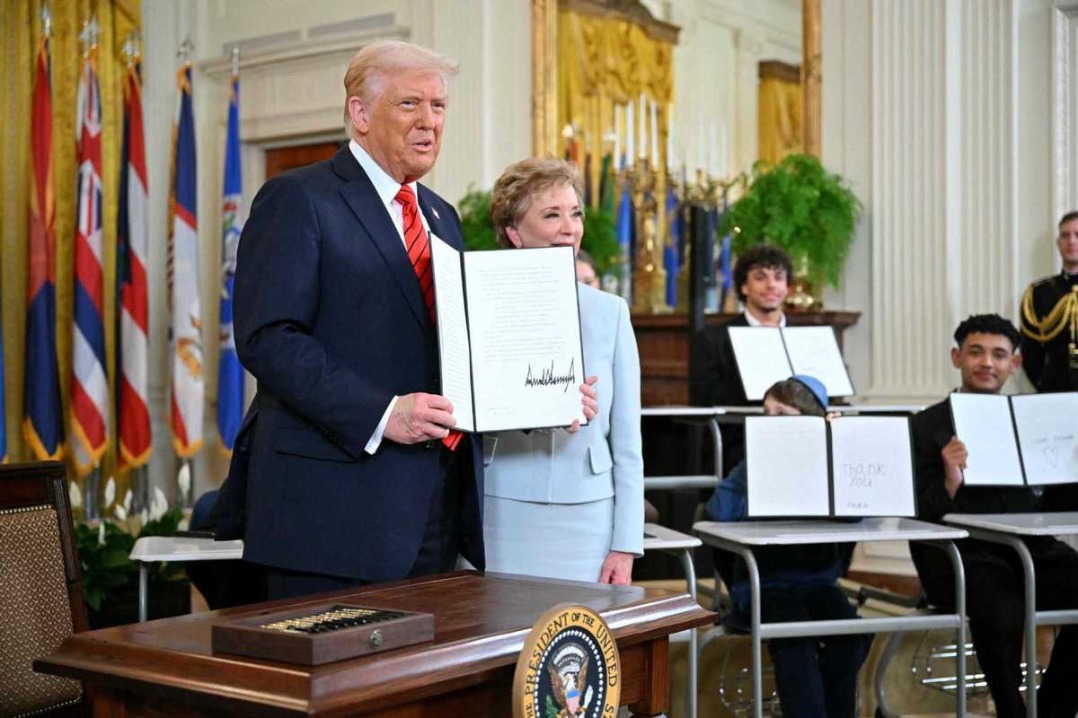Colleges face steep cuts in US funding


Gracie Hines, a senior at West Virginia University, was looking forward to her PhD work in a pharmaceutical research program at the school later this year.
Then she got an email that her admission to the program was "rescinded" based on a federal budget cut.
"I got my dream taken away from me today," she posted on her Facebook account, along with a screenshot of the notice on March 3. "I am confused and heartbroken. I have no idea what to do next. Make it make sense."
The US higher educational system is losing large amounts of federal funding for numerous programs involving the US Agency for International Development (USAID), the National Institutes of Health (NIH), and diversity, equity and inclusion (DEI) programs. Some are losing grants based on alleged antisemitism.
Facing deep budget cuts and frozen funds by the Trump administration, US colleges and universities are laying off staff, rescinding PhD offers, freezing hires and raises, restricting business travel and reducing research and graduate programs across the country.
"The academic model on which the universities relied to conduct their research, to fund their students, to fund postgraduate students — all this is in crisis, because a lot of it, in some way, was funded through federal grants," Aseem Prakash, a political scientist at the University of Washington in Seattle, told Nature. "This is a massive shock."
Overall, the US taxpayers fund an estimated $81 billion in academic scientific research and development annually, according to the international Organisation for Economic Co-operation and Development.
In mid-March, John Hopkins University (JHU) announced that it was laying off more than 2,200 people and furloughing another 100 on a reduced schedule as a result of budget cuts. It is the largest layoff in JHU's history.
A lot of those jobs were funded by USAID and are outside of the US. With USAID dismantled by US President Donald Trump and the Department of Government Efficiency (DOGE) led by Elon Musk, JHU lost $800 million in funding.
NIH is the largest government research funding agency in the US. It issued $35 billion in grants to fund various medical research programs in more than 2,500 research institutes in fiscal year 2023, according to its own statement.
In early February, the NIH issued new guidance to cap indirect research costs at 15 percent, down from the average NIH indirect cost rate of 27-28 percent, for a total of $4 billion in funding cuts.
More than 300 grants have been terminated and $1.5 billion in funding has been delayed at NIH, Monica Bertagnolli, former director of NIH in the Biden administration, said at a forum Wednesday organized by US Senator Tammy Baldwin, a Democrat from Wisconsin.
She said that NIH-funded advances have contributed to reductions in death rates from cancer, heart attacks and stroke in the United States. With projects being canceled midstream, years of research data likely would be wasted and the role of the NIH as the world's leading funder of biomedical research was at risk of being displaced, she said.
Whitney Wharton, an Alzheimer's disease researcher at Emory University, said the NIH-funded research was at risk of driving away a generation of researchers.
"These cuts are very, very devastating and they're very scary for young investigators, for students, whether they've been affected or not," Wharton said. "These young scientists may leave research altogether because they're nervous."
"I hear anecdotally now all the time of people who are not coming to the United States as international students because of fears," Lee Bollinger, Columbia University president emeritus, told CNN. "There is evidence of this in schools where applications are down considerably from various countries, with major consequences for the financial bottom line of various schools and departments, but also for the richness of our educational system."
Also affected are DEI programs that provided funding to colleges to provide scholarship and housing to groups that have historically been underrepresented or discriminated. The Trump administration has contended that the programs are divisive.
The federal government cut more than $350 million in grants related to DEI programs and also cut some schools' funding over DEI policies.
On March 25, the University of Pennsylvania lost $175 million in federal funding over the school allowing a transgender athlete to compete in women's sports.
A spokesperson for UPenn said that the university does not have a specific policy for transgender athletes and follows NCAA and Ivy League conference guidance.
UPenn also faces another potential $240 million cut if the NIH moves forward with a newly capped indirect cost rate of 15 percent. The school also has decided to significantly reduce graduate admissions.
Some universities lost funding due to students' protests over Israel's invasion and bombing of Gaza. The Trump administration has called some of the protests antisemitism.
The federal government canceled $400 million grants and contracts with Columbia University in early March over the issue.
About 60 universities are under civil rights investigations for potential "antisemitic discrimination and harassment".
Columbia officials ceded to the demands of the government about two weeks after the $400 million cancellation.
The school agreed to hire more police officers and give them more power to arrest students; ban face masks except for religious or medical reasons; adopt an updated definition of antisemitism; and appoint a new senior vice-provost to oversee its Center for Palestine Studies and the departments of Middle East, South Asian and African studies.
However, Columbia's concession is only a "precondition for formal negotiations" to continue its "financial relationship with the United States government", the government said in its letter to the school.
While the federal government called Columbia's concession a "positive first step", labor unions representing professors and other educators sued the Trump administration over the $400 million on Tuesday, accusing the administration of leveraging the funds to interfere with free speech and academic independence.
"This action challenges the Trump administration's unlawful and unprecedented effort to overpower a university's academic autonomy and control the thought, association, scholarship, and expression of its faculty and students," said the lawsuit filed by the American Association of University Professors (AAUP) and the American Federation of Teachers.
"We're seeing university leadership across the country failing to take any action to counter the Trump administration's unlawful assault on academic freedom," Reinhold Martin, a Columbia professor of architecture and president of the Columbia-AAUP, said in a news release. "As faculty, we don't have the luxury of inaction. The integrity of civic discourse and the freedoms that form the basis of a democratic society are under attack. We have to stand up."
Universities also are facing a loss in funding at the state level. In Texas, when both the House and the Senate unveiled their state budget proposals a month ago, both included an item eliminating the institutional enhancement fund that provided $423 million to Texas universities in the last budget cycle. If passed, major public universities will see a cut to their pocketbooks, and hence, academic programs.
"If they don't kick DEI out of their schools, they're going to get a lot less," Texas Lieutenant Governor Dan Patrick has said.
Agencies contributed to this story.
mayzhou@chinadailyusa.com

































